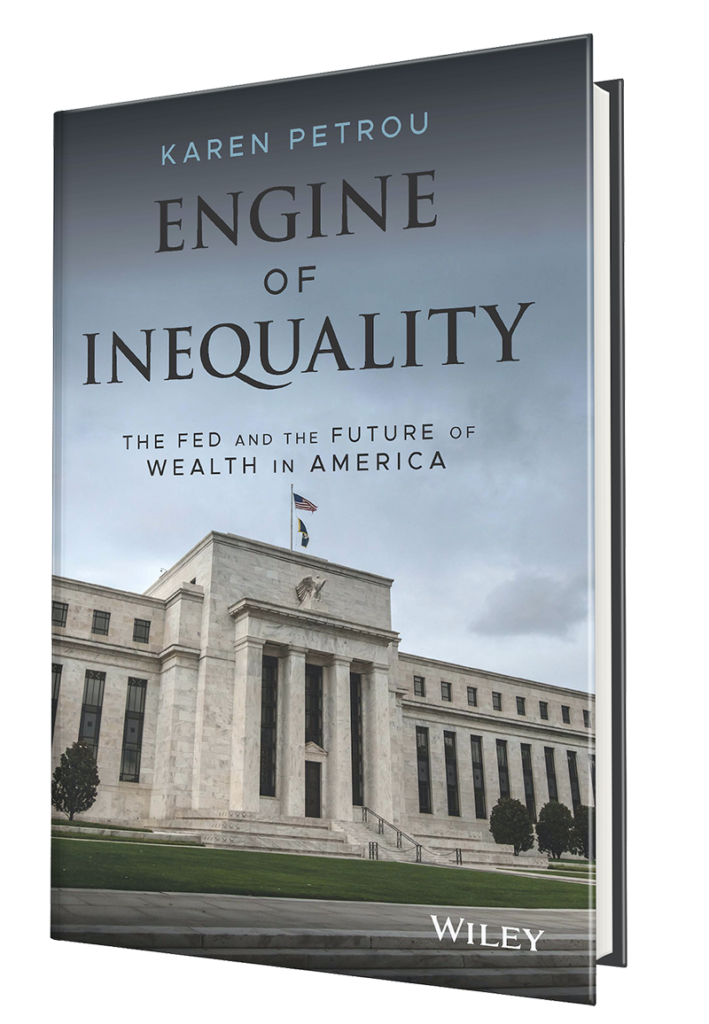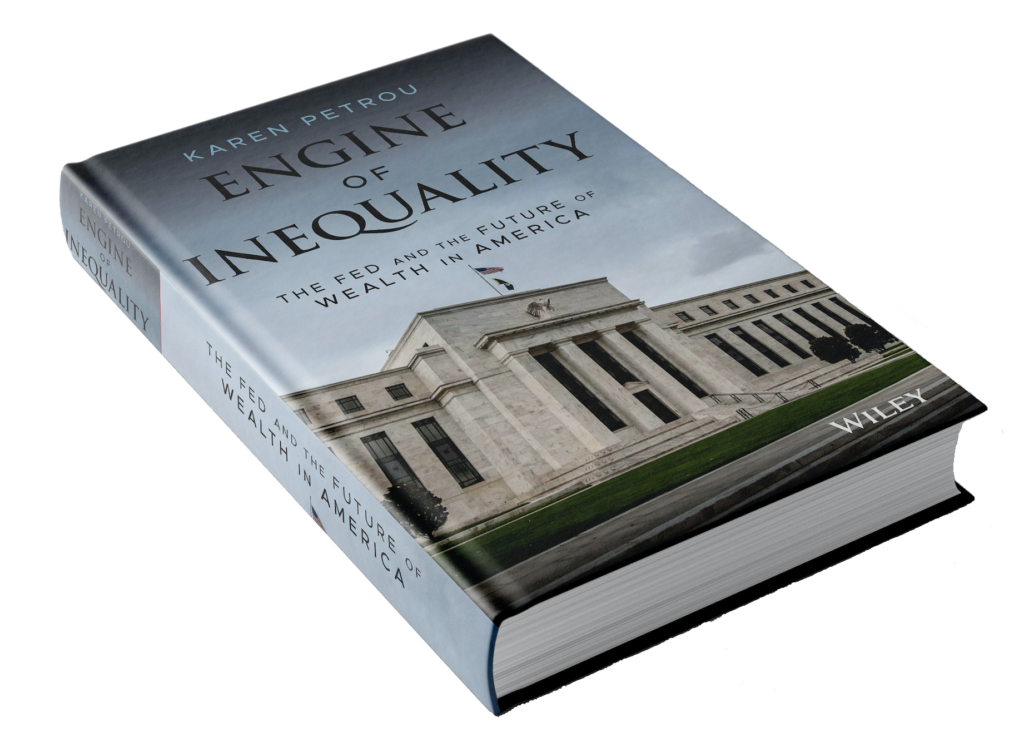Economic inequality in America is a problem that is not going away. Even before the COVID-19 crisis wrought havoc on the economy, the disparity between the rich and the poor was at levels not seen since World War II.
Moonshot proposals to curb inequality in America include progressive tax reform aimed at the one-percenters, mass cancellation of student loans, and an overhaul of public education. While these may all be formidable weapons to fight inequality, they have little chance of clearing the necessary political hurdles in Washington.
Without bipartisan consensus, are we doomed to watch idly as the yawning gap between the rich and poor grows dangerously out of control?
As one of the most insightful policy observers in the world, Karen Petrou argues we’re looking for solutions in all the wrong places. In Engine of Inequality, she persuasively takes dead aim at the Federal Reserve as a crucial but unrecognized source of economic inequality and offers meaningful policy proposals that don’t require an act of Congress.
Since the 2008 financial crisis, inequality has been rapidly increasing in no small part because of policies enacted by the Federal Reserve. Monetary and regulatory policy may seem far afield from economic inequality—but who gets the money how is the mission-critical job of central banks such as the Fed, which move money across our financial system. Like it or not, the Fed’s policies have a profound impact on the balance of equality.
Petrou boldly suggests the Fed must pull its head out of the sand. She details the hard data showing how the Fed’s post-crisis policies have unintentionally exacerbated the problem: reliance on aggregate data like Gross Domestic Product (GDP) obscures the economic reality of American families, trickledown programs that rescue financial markets only benefit the rich, ultra-low interest rates impede meaningful savings by the middle class, and others.
Engine of Inequality also reveals several pragmatic actions that the Federal Reserve can and should take immediately to reverse its adverse influence on economic inequality and turn its power to move the money into a force for shared prosperity. Engine of Inequality unveils the powerful financial policy levers that could be pulled to address economic inequality in America and offers a veritable playbook for a more equitable Federal Reserve. Petrou’s proposals are within reach and cut across wealth, racial, and gender divides.


“Petrou’s book uncovers a hidden engine of our skyrocketing inequality: financial-policy. In an accessible and engaging prose, Petrou takes us through the inner workings of monetary policy at the Fed and financial regulations, how they’ve made inequality worse and how they could instead be retooled to take us to a more equitable future. A novel look at the problem of inequality and bold ideas to help resolve it. A must read.”
“This book is highly critical of Fed policy and will receive a lot of attention, especially if Fed policy doesn’t work in the coming years.”
“Karen Petrou, one of the world’s deepest financial thinkers, puts her finger on the proximate cause of the pre- and post-Covid enormous increase in the stock market and associated growth in extreme U.S. wealth inequality. It’s the Federal Reserve’s ongoing No-Cost Lender of First Resort Policy. Her book is a tour de force—brilliant, fundamental, elucidating, and engaging. It’s also a sad story about well-meaning policy boomeranging badly on the middle class.”
“Petrou is justly renowned for her encyclopedic knowledge of financial regulations, having advised a wide range of corporate and institutional clients for decades on the impact of regulations on financial institutions and markets. Given that pedigree, one might be surprised that the subject of this passionate book is the growing economic inequality in the United States and what financial regulators should do about it… Her analysis requires a reconsideration of several widely held assumptions about the distribution of income and wealth in the United States… This debate is long overdue.”
“Karen Petrou has for decades played the quiet role of consultant and adviser to banks, central banks, and large investors, helping them slash through the confusion of constantly evolving monetary and regulatory policy. It’s a job that prioritizes dispassionate analysis over advocacy. Today, that changes, with the publication of her new book.”
“[Petrou] draws a direct connection between the Federal Reserve’s decisions and the rich getting richer, with others struggling to get by.”
“Banking consultant Karen Petrou is right that Federal Reserve policies have helped the rich.”
“A lot of digital ink has been spilled on inequality, but Petrou’s analysis is unique. She explores how misguided Fed policy fuels inequality, why it matters, and how she’d recraft monetary policy and regulation. And she believes the future is bleak for banks and their communities if changes don’t occur.”
“The financial-policy expert explores income inequality, the trouble with digital currencies, and why we still need the Fed.”
Order your copy now
Further Work on Inequality
PODCAST/BROADCAST
- Your move, Federal Reserve: Sabri Ben-Achour host of NPR’s Marketplace Morning Report: Today is the eve of Fed Chair Jerome Powell’s speech, where he’s expected to lay out the current economic landscape and offer hints as to what the Fed might do with it in a couple of weeks. For more, we talk with Karen Petrou of Federal Financial Analytics. November 29, 2022
- Central Banks and Policy Coherence: An online roundtable of a panel of experts with questions posed by the moderator and the audience through the chat function. Co-organized by the Council on Economic Policies and RADIX. November 23, 2021
- NPR, On Point, Why the Federal Reserve is an ‘engine of inequality’: Host Meghan Chakrabartti of WBR talks to Karen Petrou about what’s causing economic inequality — stagnant working class income, the way the U.S. taxes wealth v. wages, the high cost of living. But banking insider Karen Petrou says there’s a powerful driver of inequality that’s avoided real scrutiny: the Federal Reserve. “The Fed is the only entity I know of that could, under current law, make a meaningful difference,” she says. Today, On Point: Interest rates, inflation, employment. That’s where the Fed formally flexes its power. That’s also why Petrou says it’s an ‘engine of inequality.’ Could that change? November 1, 2021
- NPR Marketplace Morning Show: Host and senior editor David Brancaccio talks to Karen Petrou on the Fed’s upcoming Jackson Hole conference on August 27 (04:58min). August 26, 2021
- PBS Frontline: The Power of the Fed: When COVID-19 struck, the Federal Reserve stepped in to try to avert economic crisis. As the country’s central bank continues to pump billions of dollars into the financial system daily, who is benefiting and at what cost? Watch Karen Petrou’s on-camera interview in this featured documentary. July 13, 2021.
- Trend Following Radio interview with Host Michael Covel: “Let’s get a little controversial today…Following the 2008 financial crisis, the Federal Reserve’s monetary policy placed much greater focus on stabilizing the market than on helping struggling Americans. As a result, the richest Americans got a lot richer while the middle class shrank and economic and wealth inequality skyrocketed. Karen Petrou offers pragmatic solutions for creating more inclusive monetary policy and equality-enhancing financial regulation as quickly and painlessly as possible. Karen Petrou knows what drives the decisions of federal officials and how big banks respond to financial policy in the real world. Instead of proposing legislation that would never pass Congress, the author provides an insider’s look at politically plausible, high-impact financial policy fixes that will radically shift the equality balance. July 4, 2021
- Bloomberg TV: Karen Petrou discusses Engine of Inequality with Bloomberg Markets hosts Caroline Hyde, Romaine Bostick, and Taylor Riggs (33:52 min). June 28, 2021
- NPR Marketplace Morning Show: Host and senior editor David Brancaccio talks to Karen Petrou. Karen discusses Biden’s economic proposals and how she sees them being at odds with policy from the Federal Reserve. April 29, 2021
- Chicago Booth Review, Capitalisn’t: Is the Federal Reserve An “Engine of Inequality“? What is causing the widening wealth gap in America? People point fingers in many different directions, but a fairly new idea is to blame the Federal Reserve. Karen Petrou joins Bethany McLean and Luigi Zingales to present her argument for why the Federal Reserve’s ultra-low interest rate policy has benefited the wealthy at the expense of the poor on the Capitalisn’t podcast series. April 22, 2021
- NPR Marketplace Morning Report: Host and senior editor David Brancaccio, speaks with Karen Petrou, co-founder of Federal Financial Analytics. She said that Federal Reserve Chair Jerome Powell “has very cautiously said that the Fed is open to it, but it will not rush into it.” Petrou explains that Powell is taking this approach because of how critical the U.S. dollar is to both the country and the world, and therefore “a central bank digital currency based on the dollar has got to be really, really sound.” April 20, 2021
- Foundation Fighting Blindness: Senior Director, Ben Shaberman, interviewed Karen Petrou about her book. April 1, 2021
- Grant’s Current Yield Podcast: Host James Grant Discusses Engine of Inequality with Karen Petrou.. March 31, 2021
- American Banker, Bankshot: Host John Heltman talks to Karen Petrou about her book and Fed’s emergency lending powers. (Listen at 00:11:00), March 31, 2021
- New Books Network: Listen to Dr. Stephen Pimpare, Principal Lecturer at the University of New Hampshire, and Karen Petrou’s conversation on his podcast series. . March 24, 2021
- Hidden Forces: Host Demetri Kofinas speaks with Karen Petrou about how monetary policy and financial regulations have changed in the years since the great financial crisis and how those changes have destabilized financial markets by transferring risk from the more tightly regulated banking sector to other parts of the system. March 15, 2021
- The Pomp Podcast: Host Anthony Pompliano, talks with Karen Petrou about the Federal Reserve and wealth inequality. March 4, 2021
- Hale Report: Host Lyric Hughes Hale talks to Karen Petrou about her book and research focused on economic policy, especially in regard to banking regulation. March 4, 2021
- Banking With Interest: Listen to Rob Blackwell interview with Karen Petrou on her book, how the Fed created the “Engine of Inequality” — and how we can fix it. March 3, 2021
- NPR Marketplace Morning Report: Host and senior editor, David Brancaccio, interviews Karen Petrou on her new book Engine of Inequality: The Fed and the Future of Wealth in America. March 3, 2021
REVIEW/PRINT/ONLINE
- Phenomenal World: Melinda Cooper, professor of sociology at Australia National University, on Karen Petrou’s “Engine of Inequality”, July 28, 2022
- Barron’s op-ed: An opinion piece by Karen Petrou, “The Fed’s Anything-We-Can-Think-Of Monetary Policy Isn’t Working”, linked to the her book and building on its solutions in light of current inflation. June 3, 2022
- The Independent Review, A Journal of Political Economy. By Daniel Smith. In the Engine of Inequality, Karen Petrou argues that inequality is a fundamental problem threatening life expectancy and political polarization and exposes our nation to financial risk, especially during economic downturns. This, she argues, justifies the Fed addressing inequality as an additional mandate, mainly since other legislative fixes either will never materialize or will take too long to implement….. Volume 26 Number 3, Winter 2021/22
- Bloomberg: Host Caroline Hyde talks with Federal Financial Analytics’ managing partner Karen Petrou about how the Federal Reserve tackles price instability and income inequality with Bloomberg’s Caroline Hyde. January 18, 2022 (21min in)
- The Hill: Karen Petrou’s latest op-ed in The Hill, in which she poses several questions that should be asked of FRB Chair Powell during upcoming hearings on his renomination for Fed Chair. These are based on the arguments Karen makes in Engine of Inequality and its underlying research, as well as economic data in the months following its release. December 14, 2021
- Ipsos: Kate MacArthur of Ipsos interviews Karen Petou in their What the Future: Wealth issue. The interview identifies Karen as the author of Engine of Inequality: the Fed and the Future of Wealth in America and includes questions on matters discussed in the book.
- Mises Institute: Ryan McMaken, editor of Mises Institute, calls Engine of Inequality, “important.” He also says that Karen Petrou is “one of the more interesting and informative analysts examining the financial services sector,” going on to agree with many of the book’s policy conclusions. September 15, 2021
- Barron’s Op-Ed: An opinion piece by Karen Petrou, bringing us current after the Jackson Hole meeting, emphasizing that the Fed understands that its current monetary-policy construct is not achieving its macroeconomic or stability goals. However, it also doesn’t know how to gradually reverse course, thus going farther and deeper into a morass from which it wants to get out, but can’t. Inequality impact is of course a major result of this impasse, but Karen also addresses significant employment, output, and inflation gaps between what the Fed wants and what the U.S. got. September 9, 2021
- Bloomberg Op-Ed: An opinion piece by Karen Petrou about economic inequality and opportunity. “The “almighty dollar” is facing a raft of challenges from other supra-national currency powerhouses such as China and from giant technology companies that understand they would exercise even more market clout if they controlled not just what we buy and sell, but also how we pay for it. If the Fed doesn’t quickly redefine the dollar to reflect its rapid digitalization by other hands, central banks will join shopping malls on the long list of complacent category killers felled by agile competitors….” August 16, 2021
- New York Times Op-Ed: A Karen Petrou opinion piece laying out why lower for longer interest rates and a huge Fed portfolio combine to make U.S. wealth inequality even worse. Based in part on her book, the guest essay marshals the most recent market data to make still more clear that the divide between market rates and negative real savings rates will have profound, lasting impact unless the Fed begins gradually to raise rates and reduce its portfolio well before 2023. July 12, 2021
- The Hill Op-Ed: By Karen Petrou: Common sense rules can cure cryptocurrency’s curse. Karen argues that the Basel Committee’s recent consultation on establishing rules of the road for cryptoassets will help, not hinder, wider adoption. June 27, 2021
- The Hill: By Sylvan Lane: Pressure builds for Fed chief as inflation surges. In this article, Sylvan Lane writes that The Federal Reserve is facing growing scrutiny from Wall Street and Washington over its cryptic plans to eventually pull back stimulus from an economy that’s starting to struggle with inflation. He quotes Karen Petrou saying “the Fed and the Future of Wealth in America.” “It’s continued increase in its portfolio combined with rates that are negative in inflation-adjusted terms just drives not only a tremendous amount of wealth inequality, but also distortions in productivity.” June 15, 2021
- Financial Times Op-Ed: By Karen Petrou: The US central bank has misread both the data and its mandate. In this op-ed, Karen Petrou writes about the dangers of looking at “bad data” and how the Fed’s reliance on it results is misunderstanding the real impact of inflation on inequality. June 7, 2021
- The American Prospect: By David Dayen: The Fed Becomes the Nation’s Only Bank Regulator. In this article, Dayen quotes Karen Petrou and her new book saying …Certainly, in the run-up to the housing bubble, the Fed was not seen as tough on banks, after longtime chair and Ayn Rand acolyte Alan Greenspan downgraded regulation and supervision in favor of allowing market discipline to govern. Greenspan and his successor Ben Bernanke insisted that the damage from subprime mortgages would not spread to the overall banking system, a serious error. The central bank “missed a great deal of the problems that led up to the 2008 crisis,” said Karen Petrou, co-founder and Managing Partner of Federal Financial Analytics, a banking consultant, and author of Engine of Inequality, a book about the Fed. After the crash, policymakers noted the Fed’s dual mission of protecting the safety and soundness of the banking system and of protecting consumers. These were seen so much at odds that the Consumer Financial Protection Bureau was created to take the consumer protection function out of the Fed, which regarded it as a lesser imperative anyway”. June 3, 2021
- Wall Street Journal: By Jon Hilsenrath: Inequality Would Widen if U.S. Policies Spur Sustained Inflation. Hilsenrath writes that Federal Reserve and Biden Administration officials say economic inequality is bad and they aim their policies in part at helping to reduce it. In the short run, at least, those policies might be widening inequality, not shrinking it. Hilsenrath quotes Karen Petrou: “I don’t see anything good happening from an economic inequality perspective,” said Karen Petrou, a financial analyst and author of “Engine of Inequality,” a critique of Fed policy. “Most American households are living hand to mouth.” Ms. Petrou said a decade of the Fed’s low-interest-rate policies have mostly helped the wealthy by pushing stocks higher. That effect has accelerated recently. While inflation-adjusted wages fell in April from a year earlier, the Dow Jones Industrial Average was up more than 40% over the same period. The wealthiest 10% of U.S. households own 88.5% of stocks, according to Fed data. May 16, 2021
- Wall Street Journal: By Ben Eisen: Housing-Market Surge Is Making the Cheapest Homes the Hottest. Karen Petrou, author of Engine of Inequality: The Fed and the Future of Wealth in America says it is unclear if the recent rise “is a sign of upward and sustainable wealth accumulation for low-income and minority households,” and arguing that, “the data are at best equivocal on that point.” May 12, 2021
- American Banker Book Review: By Richard Herring, Jacob Safra Professor of International Banking and Professor of Finance at the University of Pennsylvania’s Wharton School of Business. Since the financial crisis in 2008, the Federal Reserve has embarked on the most accommodative monetary policy in its history. Between low interest rates and quantitative easing — known as QE — the Fed has never done so much to encourage investment and lending for so long. Those policies are designed to lower unemployment and help ordinary Americans, but in her new book, “Engine of Inequality, The Fed and the Future of Wealth in America,” Federal Financial Analytics managing partner Karen Petrou argues the central bank is actually doing more harm than good. Petrou is justly renowned for her encyclopedic knowledge of financial regulations, having advised a wide range of corporate and institutional clients for decades on the impact of regulations on financial institutions and markets. Given that pedigree, one might be surprised that the subject of this passionate book is the growing economic inequality in the United States and what financial regulators should do about it. April 30, 2021
- 3BL Media: Hazel Henderson’s article titled Evolving Finance, Money and Markets cites Karen Petrou and Engine of Inequality. April 27, 2021
- Washington Post: By Allan Sloan and Cezary Podkul | Pro Publica: The Fed helped fuel a stock market boom that benefited wealthy Americans — and left behind everyone else: Low-interest policies helped stabilize the economy, but they also set off a multitrillion-dollar run-up in markets, which overwhelmingly benefited the richest 10 percent of Americans. Ever since the covid-19 pandemic struck, the Federal Reserve has gotten plenty of kudos for moves that have helped stabilize the economy, kept house prices from tanking and supported the stock market. But those successes have obscured another effect: the inadvertent impact the Fed’s ultralow interest rates and bond-buying sprees are having on economic inequality…“Inequality is a cumulative process,” said Karen Petrou, author of “Engine of Inequality: The Fed and the Future of Wealth in America” and managing partner of the Washington-based consulting firm Federal Financial Analytics. “The richer you are, the richer you get, and the poorer you are, the poorer you get, unless something puts that engine in reverse,” she said. “That engine is driven not by fate or by untouchable phenomena such as demographics but most importantly by policy decisions.” April 27, 2021
- Washington Independent Review of Books: Read Christopher Schroeder‘s interview with Karen Petrou reviewing her book. April 21, 2021
- CPA Practice Advisor: An article by Kathryn Petralia, co-founder of Kabbage, an American Express Company, titled: Don’t Call It a Recovery Yet: Small Business Growth Still Lags. April 20, 2021
- The Hill Op-Ed: Read Karen Petrou’s op-ed: Dimon’s $500 billion proposal opens the door to equitable mortgages. In his recent note to shareholders, Jamie Dimon includes a startling number: $500 billion more mortgage credit a year would flow if the rules recognized that many lower-income borrowers aren’t also high-risk borrowers. JPMorgan Chase & Co. cares about this in part because it wants to make these mortgages, but we should care about it because we should want JPMorgan and other regulated lenders to provide the urgently-needed loans essential for reversing U.S. economic inequality. April 14, 2021
- The Hill Op-Ed: Karen Petrou’s latest op-ed on how bad Fed data lead to inequitable policy and key fix-it steps. March 23, 2021
- Bloomberg: Peter Coy reviews Karen Petrou Says Higher Rates ‘Should Be Resolutely Pursued’ and also writes “… Petrou is right that Federal Reserve policies have helped the rich. It’s not so clear, though, that reversing those policies would help the poor. The Fed’s marble headquarters appears under a foreboding sky on the cover of Petrou’s new book, Engine of Inequality. March 12, 2021
- New York Times DealBook: Reviews Engine of Inequality: As stock markets set new highs, Karen Petrou is mad about monetary policy. Ms. Petrou, co-founder and managing partner of Federal Financial Analytics, a Washington-based consultancy, got so angry that she wrote a book about it, “Engine of Inequality: The Fed and the Future of Wealth in America.” In it, she draws a direct connection between the Federal Reserve’s decisions and the rich getting richer, with others struggling to get by. March 12, 2021
- Reuters: Review by Henry Engler, Senior Editor, Regulatory Intelligence at Thomson Reuters. “Forthcoming book by Karen Petrou of Federal Financial Analytics offers some provocative recommendations for U.S. policymakers on bridging the widening income gulf in America.” March 11, 2021
- American Banker, BankThink: Karen Petrou’s op-ed in laying out politically-viable ways to level the financial-regulatory playing field and promote economic equality. March 5, 2021
- Porchlight Blog, Editor’s Choice: Dylan Schleicher’s blog on Karen Petrou’s book Engine of Inequality: The Fed and the Future of Wealth in America. March 5, 2021
- Barron’s: Karen Petrou’s Q&A with Matt Peterson, talking about her new book Engine of Inequality: The Fed and the Future of Wealth in America. March 3, 2021
- Inequality.org: An op-ed by Karen Petrou. March 1, 2021
EVENTS
- Patriotic Millionaires, Deep Dive #6: Karen Petrou speaks on “Inflation, Inequality, and the Inexcusable: Fixing the U.S. Economy and Its Discontent.” Her full comments and the research behind them are here. July 13, 2022
CFA Society Minnesota: Putting Investors First: Is the Fed Fueling Inequality? + Society Social: Karen Petrou, one of the foremost global experts in financial regulation, kicked off a heated debate last year when she published her book, Engine of Inequality: The Fed and the Future of Wealth in America. She then followed up with a July op-ed in The New York Times, “Only the Rich Could Love This Economic Recovery.” Baird Vice Chairman John Taft will moderate a discussion with Karen on why she believes “the U.S. central bank has played a direct, if wholly unintended, role in driving income and wealth inequality to astonishing heights.” April 14, 2022
- The Harvard Club of Washington: with host Kevin Corke: In Engine of Inequality, Petrou offers pragmatic solutions for creating more inclusive monetary policy and equality-enhancing financial regulation. How the U.S. Federal Reserve inadvertently – but dramatically – exacerbated U.S. income and wealth inequality after 2010. Approaching the problem from a pragmatic, market-focused perspective, Karen demonstrates how the combined force of post-2008 monetary and regulatory policy made Americans more unequal, the financial system even more fragile, and voters angrier. April 12, 2022
- Institute for International Economic Policy, At the Elliott School of International Affairs. George Washington University: Rethinking Capitalism and Democracy event entitled “The U.S. Federal Reserve and Economic Inequality.” This event will feature Karen Petrou (Federal Finance Analytics), with discussant remarks by Mark Levonian (formerly of Promontory Financial Group), Bill Nelson (Bank Policy Institute), and Peter Conti-Brown (University of Pennsylvania). Watch it here. January 26, 2022
- NOLHGA’s 29th Legal Seminar: Economic Equality & Inclusion in Insurance. Peter Gallanis: President, NOLHGA (Moderator), George Nichols III: President & CEO, The American College of Financial Services, Karen Petrou: Co-Founder & Managing Partner, Federal Financial Analytics. July 23, 2021
- Washington Bankers Association’s 2021 Virtual Convention: Karen Petrou was one of the featured speakers at this event. She talked about equality, equity and inclusion: how bankers can change financial polity to make still more of a difference. July 15, 2021
- Predistribution Initiative: Dynamics Between Central Banks, Regulators, Investors, and Inequality, featuring Karen Petrou, in conversation with Raphaele Chappe, Chief Economist, on how monetary policy is affecting both investment dynamics and inequality, and what investors can do. Participants heard key takeaways from Karen’s book: Engine of Inequality: The Fed and the Future of Wealth in America, which explores unintended negative consequences of the U.S. Fed’s policies in this context and how they can increase systemic risks such as inequality, as well as systematic risks for investors and markets. As global indebtedness increases, it becomes more difficult to ever raise interest rates. This in turn makes it much more difficult for asset owners and allocators such as pension funds to meet required returns for their beneficiaries, and it increases wealth disproportionately for those who already own assets relative to those who do not. May 24, 2021
- RBC Wealth Management: Seminar/book discussion: Karen Petrou shared her insider’s look at how the Federal Reserve drives economic inequality and a pragmatic playbook for a more equitable central bank. April 29, 2021
- International Monetary Fund: Karen Petrou was a guest speaker at the IMF’s Macrofinancial Seminar Series. “Can central bank policies be fine-tuned to better support inclusive growth in the post-Covid era? In her new book, Karen Petrou zooms in on economic inequality in America, arguing that U.S. Federal Reserve policies have unintentionally exacerbated inequality. She points to over-reliance on aggregate data, programs that rescue financial markets benefitting the rich, low interest rates that impede meaningful savings by the middle class, and others. The seminar will be an opportunity for open discussion on these issues as well as the pragmatic actions that Karen Petrou suggests the Federal Reserve can take to turn its power to move the money into a force for shared prosperity across wealth, racial, and gender divides.” April 27, 2021
- New York CFA Society’s event: Infinite Intervention: Rates, Trade, and Economies in a Post-Recovery World. This event featured a wide-ranging discussion on several topics, including the impact of continued negative rates in a rising yield environment, as well as a look at international economic priorities during the ongoing recovery period and a handful of important secondary effects. Seemingly permanent QE continues to influence long-term economic forecasts; these conditions of “infinite intervention” have significant repercussions for firms in the asset allocation space, while also affecting ongoing global trade and commodities. Click here for a short clip of the event. April 21, 2021
- The Federalist Society Book Review Teleforum: “In her landmark book, financial services doyenne Karen Petrou explains how, despite better intentions, Federal Reserve policies have been major drivers of economic inequality in America. Beginning with 2010 policies that widened the wealth gap, the Fed more than doubled down on its errors in 2020. Petrou, however, proposes a program of politically plausible changes in Fed policies to promote greater financial equality, economic growth, and financial stability, without requiring changes in legislation. Former Treasury Assistant Secretary Wayne Abernathy will engage in a frank discussion with Petrou about her new book, the problems she identifies in Fed policies, and how she sees her proposals rising above partisanship to achieve the goals she sets out”. March 25, 2021
- Horasis Extraordinary Meeting on the USA, Rebuilding Trust: The Next Frontier: From Regulation to a Trust-based Economy. Karen Petrou along with other panelists discussed why many societies rely heavily on distrust-driven measures to regulate behavior: to constrain people with penalties or by prohibitions. The distrust economy believes that rules are all we need, and then the market will prevail. How to instill trust in the other without having to read the small print? What shift will this take across generational divides and cultural boundaries? Who will lead the way? March 18, 2021
- Exchequer Club: Q&A by Richard Hunt, President and CEO of the Consumer Bankers Association (CBA) and the Chancellor of the Exchequer Club. Members only. March 17, 2021
- Review of Banking & Financial Law, Boston University School of Law: Karen Petrou discussed her book with Professor Laurence Kotlikoff and Douglas Holtz-Eakin, President of the American Action Forum. Moderator: Beth Healy, senior investigative reporter for WBUR. March 12, 2021
- Cato Institute: Karen Petrou and @GeorgeSelgin‘s conversation at Cato Institute’s virtual book forum about her new book Engine of Inequality: The Fed and the Future of Wealth in America. March 4, 2021










